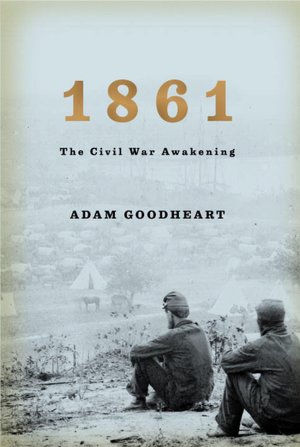In my previous post on 1861: The Civil War Awakening by Adam Goodheart I suggested that the book described the atmosphere from which the Civil War emerged.
We are in an election today, and even the average citizen is inundated with statistics on the voters and their opinions. Campaigns are fed with detailed statistics based on extensive surveying and massive data processing, in turn based on detailed models of voter behavior which enjoy a strong basis in theory and testing.
Democracy was relatively new in the United States in 1861, statistics was a new field of study, there were no computers available for rapid data processing, and political science was at best a twinkle in the eyes of a few of its founding fathers.
Goodhart can not begin to describe the atmosphere in public opinion at the beginning of the Civil War in a way that is satisfying to our jaded palates. What he has done might be compared to a post impressionist artist who paints a scene to provide a pleasing whole, conveying the feel of the original with broad strokes rather than photographic realism.
Part of the translation of public opinion into government decisions -- and in this case war -- is carried out in the government bureaucracy. Again, we know a lot about how government bureaucracies work, but the bureaucracy of the Confederate government did not exist during the period of this book, and that of the Union was over stressed, expanding at a vertiginous rate to meet the demands of the war (while beginning a period of unparalleled national economic growth). Especially odd to our modern experience was the penetration of the Union bureaucracy by people who would leave to join the Confederacy, but who were providing Confederate leaders with detailed intelligence on Union plans and discussions.
Another part of the translation is carried out in the political system. In 1861 the Whig party and the No Nothing party had disappeared, the Republican party was new born, and candidates from four parties had received electoral votes in the presidential election. The Democratic party would reorganize having lost its base in the south, and the Congress saw the mass exodus of the legislators from the south. Lincoln was elected, his only experience in national office being one term in the House of Representatives.
At the best of time, the processes by which policies emerge from the bureaucratic and political processes are difficult to understand, indeed all but impossible for the average citizen. In 1861, the processes were even more opaque. Clearly complex processes were going on, but they were certainly less informed by data on public opinion, and almost certainly less understood by their participants than the corresponding processes today. Goodhart's book gives only the merest hint of these processes.
Decision making in the Civil War, like decision making today, was contingent on the events that occurred in the course of the war. The firing on Fort Sumter electrified the nation, leading some southern nations to secede and war fever to seize the north. As the war progressed, Shiloh and the first Bull Run would shock people into understanding that this would be a war full of casualties. Antietam and Gettysburg would give a great boost to Union spirits and the fall of Atlanta would assure Lincoln's reelection. Goodhart give a good impression of this contingency of the emergence of policy on events.
For those of us who enjoyed the book, the enjoyment came in large part from the thought that it stimulated about public opinion, the emergence of policy from apparent confusion, and the futility of so many wars.
I had a couple of previous posts triggered in reading and discussing this book:
One last comment: Sometimes there are no good alternatives available to a decision maker. What alternatives were available to Lee, faced by a better equipped and larger opponent, well led by Grant and his officers, supported by Lincoln? Indeed, what options were available to the economic elite in the deep south with their hundreds of slaves working their large plantations? For them, betting all on a long shot may have been the best alternative.

1 comment:
I would add that the Crimean War fought in the 1850s resulted in nearly 1.5 million deaths. It was the first war that was reported in real time via telegraph, and the U.S. Army sent observers, some of whom had high rank in the Civil War. The information on the potential deadliness of war should have been available to those who took the states into the Civil War.
Post a Comment